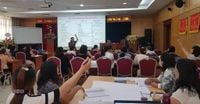In a concerted effort to preserve the Vietnamese language and promote a modern image of Vietnam abroad, educators and entrepreneurs in the United States are stepping up their initiatives. Professors and community leaders are collaborating to enhance the understanding of Vietnamese culture among Americans, aiming to foster a more comprehensive and positive perspective of Vietnam today.
Professor Kiều Linh Caroline Valverde, based in California, and entrepreneur Katherine Lam from Oregon, share a common goal of safeguarding the Vietnamese language while showcasing Vietnam's contemporary dynamism. In a recent interview with the Vietnam News Agency (TTXVN), Professor Kiều Linh recounted her journey of learning Vietnamese. Growing up in the U.S., she faced challenges with the language until her first trip back to Vietnam in 1993, where she seized the opportunity to study Vietnamese at a university. She noted the significant changes since that time, stating, "When I returned to the U.S., there were no Vietnamese language classes available, which is a stark contrast to today, where numerous centers offer Vietnamese language instruction with the aid of technology."
Kiều Linh emphasized that as Vietnam rapidly develops and showcases its rich cultural heritage, more individuals, including many Americans, are showing interest in learning Vietnamese. This interest is particularly evident among the Vietnamese diaspora, who often seek to connect with their roots, leading to an increased demand for Vietnamese language education. She advocates for greater investment in Vietnamese language programs abroad, highlighting the necessity of such initiatives to meet the genuine needs of the community.
Despite the growing interest, Kiều Linh pointed out that very few schools in the U.S. are systematically investing in Vietnamese language programs. She stressed the importance of the Vietnamese community's proactive role in promoting and maintaining the language. Kiều Linh is hopeful for collaboration between the community, overseas Vietnamese organizations, and the Vietnamese government to secure adequate resources for these efforts. She has been involved in teaching Vietnamese to her children and recognizes that the lack of structured educational environments can hinder effective learning.
During her 20 years at the University of California, Davis, Kiều Linh has consistently proposed the inclusion of Vietnamese in the curriculum. At times, her proposals have received approval, but funding issues have often led to their discontinuation. Currently, UC Davis requires Kiều Linh to find her own funding if she wishes to establish a Vietnamese language class.
Reflecting on her past, Kiều Linh recalled her successful advocacy for funding from the University of California, Berkeley (UC Berkeley) to open Vietnamese language classes for elementary school students thirty years ago. This experience laid the groundwork for her later establishment of the New Vietnam Studies Initiative, aimed at promoting a modern, dynamic Vietnam rich in cultural identity.
In the interview, Kiều Linh noted that after 50 years of reunification, Vietnam has undergone remarkable transformations and rapid development. She highlighted that Vietnamese communities in the U.S. and other countries remain deeply connected to their homeland.
Many Vietnamese individuals, even those who have lived abroad for decades, express a desire to return to Vietnam for the Lunar New Year, to visit family, or to invest in business opportunities. Some, like Kiều Linh's peers, are seriously considering returning to Vietnam to live permanently, drawn by the country's allure for both foreigners and the Vietnamese diaspora.
On the business front, Katherine Lam shared insights about Oregon being the first state in the U.S. to implement Vietnamese language programs in public schools, extending beyond language instruction to include its application in various subjects. She praised the significant contributions of the local Vietnamese community, which includes five Vietnamese American legislators currently serving in the state assembly.
These legislators successfully advocated for a $2.5 million grant two years ago to establish a community center for Vietnamese Americans, marking a significant milestone in state history. Lam noted the positive impact of the recent elevation of Vietnam-U.S. relations to a comprehensive strategic partnership in September 2023, which has facilitated new business opportunities for her company and the Vietnamese business community.
Currently, the Vietnamese community abroad is estimated to number around six million people. The Vietnamese government has consistently recognized and valued the substantial contributions of the overseas Vietnamese community to the nation's development. A significant milestone in this regard is the Politburo's Resolution 36-NQ/TW, issued on March 26, 2004, which emphasizes the importance of overseas Vietnamese as an integral part of the Vietnamese ethnic community.
In August 2022, the Prime Minister approved a project to celebrate Vietnamese Language Day within the overseas Vietnamese community from 2023 to 2030. This initiative has received enthusiastic support, leading to vibrant activities that have begun to transform the landscape of Vietnamese language education abroad.
Efforts are underway to establish Vietnamese language as a second language in schools in places like Laos and Taiwan, and the promotion of Vietnamese language learning is helping younger generations of Vietnamese abroad connect more deeply with their heritage.
Each year, the State Committee for Overseas Vietnamese collaborates with the University of Social Sciences and Humanities (Vietnam National University, Hanoi) to organize training courses for Vietnamese teachers abroad. Since its inception in 2013, these training sessions have attracted nearly 900 teachers and volunteers from various countries, highlighting the substantial demand for Vietnamese language education within the overseas community.
Professor Hoàng Anh Tuấn, Rector of the University of Social Sciences and Humanities, stated that the university has implemented numerous projects to fulfill the government's directives on preserving and promoting the values of Vietnamese culture and language. The training courses equip teachers not only with effective teaching methods for Vietnamese but also enrich their understanding of Vietnamese culture and history through practical experiences at historical sites.
The instructors for these training sessions are leading experts in literature, social sciences, and humanities. They form a crucial team for the government’s project to enhance online Vietnamese language teaching for overseas Vietnamese, which has been operational since 2022 and currently serves hundreds of expatriates annually from 25 countries around the world.

